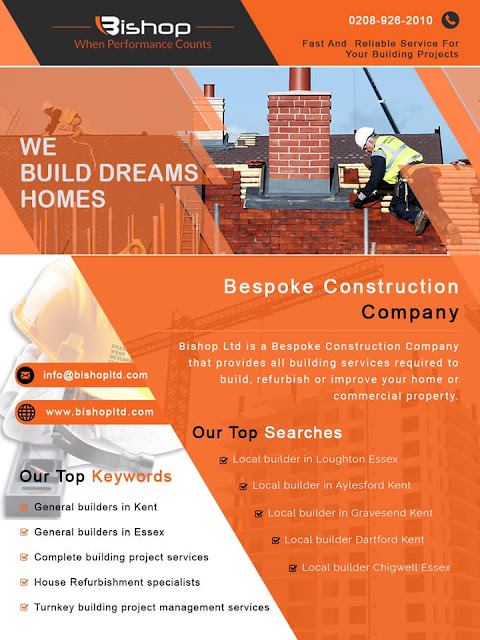Construction is outlined as “the process of constructing a building or infrastructure”. It differs from manufacturing, which typically involves mass production of similar items without a designated purchaser, while construction takes place at a pre-determined location for a known client.
A Construction Project "includes all material and work necessary for the development of a finished structure for occupancy by a client. This includes site preparation, foundations, mechanical, trade, and the other work necessary to complete the project."
All types of construction are planned and drawn out by architects and engineers, and sometimes with the help of a builder.
There are mainly 7 different types of construction projects. These include:
Residential
The most common area of construction is Residential construction. This section includes homes, townhouses, apartments, maisonettes, cottages, generally, all units used as dwellings. Governmental agencies, like local councils, employ subcontractors for structural, electrical, mechanical and alternative specialty work. This type of project will be subject to local planning laws and codes of practice.
As the most common area of construction by far, residential construction is the most competitive area in which to gain work for builders. It is usually the entry level for building companies looking to work within the construction industry. It is also the most riskiest area for a client! With so much competition builders with less experience will be eager to undercut a more reliable and established building company. This is where clients can fall victim to the “cowboy builder” so you need to do your homework on a company before parting with your hard earned money!
Extensions
Building extensions is the process of adding structure to a previously built holding. It is the most common type of construction work undertaken by a builder. Extensions can be built to almost any type of construction and be a variety of sizes and styles. They can also be utilised in numerous ways; living area, garage, storage, but the extension has to be built in the same style as the original property. Extensions usually includes installation of services, like gas and electric sources.
Institutional and business
Institutional and business construction covers larger projects like hospitals and clinics, colleges and universities, sports facilities and stadiums, distribution warehouses, office blocks and hotels. This type of construction is more specialised and has fewer competitors in the market, in turn, making the process more expensive for the client. Specialist builders and architects will be employed and are able to demand higher prices for their experience and knowledge. However, the rewards for the client can be very high for such sizeable projects.
Industrial
Industrial construction is a much smaller and less thought about sector of the construction industry, however, it is essential to our everyday life. This type of construction is very specialised and construction costs are exceptionally high. Construction here is undertaken by very large industrial firms, for example firms producing power generation, medicine, gas stations, etc.
Specialised Industrial Construction
These type of construction projects involve huge scale construction with a very high degree of technological and complex procedures. They would be used for the construction of atomic power plants, chemical process plants and oil refineries.
Highway Construction
Highway construction involves the development, alteration, or repair of roads, highways, streets, alleys, runways, paths, parking areas, etc. It includes all incidental construction in conjunction with route construction projects.
Heavy Construction
Heavy construction refers to any type of construction that does not typically fall under either "building" or "highway." Examples of this type of project would be dams, large bridges, water and sewer plants, biodegradable pollution treatment plants, and water treatment plants and facilities.This area of construction can involve many different designs of construction and all would need specialist knowledge.
Construction is a huge industry and their are numerous fields in which a construction company can be involved. The specialised areas obviously require extensive knowledge and ability to proceed but can be very rewarding for both the client and the construction company.
The residential side is flooded with local builders making it that much harder for the client to sift out the cowboys from the genuine and trustworthy building companies. However, with the help of the internet, customer reviews and testimonials, a client can be more savvy when looking for the right builder for them. Furthermore, clients should contact construction companies and raise questions about their needs before making any final decisions about employing a builder for their project.
Get Appointment for this company, click here @ Local builders in Dartford Kent
A Construction Project "includes all material and work necessary for the development of a finished structure for occupancy by a client. This includes site preparation, foundations, mechanical, trade, and the other work necessary to complete the project."
All types of construction are planned and drawn out by architects and engineers, and sometimes with the help of a builder.
There are mainly 7 different types of construction projects. These include:
Residential
The most common area of construction is Residential construction. This section includes homes, townhouses, apartments, maisonettes, cottages, generally, all units used as dwellings. Governmental agencies, like local councils, employ subcontractors for structural, electrical, mechanical and alternative specialty work. This type of project will be subject to local planning laws and codes of practice.
As the most common area of construction by far, residential construction is the most competitive area in which to gain work for builders. It is usually the entry level for building companies looking to work within the construction industry. It is also the most riskiest area for a client! With so much competition builders with less experience will be eager to undercut a more reliable and established building company. This is where clients can fall victim to the “cowboy builder” so you need to do your homework on a company before parting with your hard earned money!
Extensions
Building extensions is the process of adding structure to a previously built holding. It is the most common type of construction work undertaken by a builder. Extensions can be built to almost any type of construction and be a variety of sizes and styles. They can also be utilised in numerous ways; living area, garage, storage, but the extension has to be built in the same style as the original property. Extensions usually includes installation of services, like gas and electric sources.
Institutional and business
Institutional and business construction covers larger projects like hospitals and clinics, colleges and universities, sports facilities and stadiums, distribution warehouses, office blocks and hotels. This type of construction is more specialised and has fewer competitors in the market, in turn, making the process more expensive for the client. Specialist builders and architects will be employed and are able to demand higher prices for their experience and knowledge. However, the rewards for the client can be very high for such sizeable projects.
Industrial
Industrial construction is a much smaller and less thought about sector of the construction industry, however, it is essential to our everyday life. This type of construction is very specialised and construction costs are exceptionally high. Construction here is undertaken by very large industrial firms, for example firms producing power generation, medicine, gas stations, etc.
Specialised Industrial Construction
These type of construction projects involve huge scale construction with a very high degree of technological and complex procedures. They would be used for the construction of atomic power plants, chemical process plants and oil refineries.
Highway Construction
Highway construction involves the development, alteration, or repair of roads, highways, streets, alleys, runways, paths, parking areas, etc. It includes all incidental construction in conjunction with route construction projects.
Heavy Construction
Heavy construction refers to any type of construction that does not typically fall under either "building" or "highway." Examples of this type of project would be dams, large bridges, water and sewer plants, biodegradable pollution treatment plants, and water treatment plants and facilities.This area of construction can involve many different designs of construction and all would need specialist knowledge.
Construction is a huge industry and their are numerous fields in which a construction company can be involved. The specialised areas obviously require extensive knowledge and ability to proceed but can be very rewarding for both the client and the construction company.
The residential side is flooded with local builders making it that much harder for the client to sift out the cowboys from the genuine and trustworthy building companies. However, with the help of the internet, customer reviews and testimonials, a client can be more savvy when looking for the right builder for them. Furthermore, clients should contact construction companies and raise questions about their needs before making any final decisions about employing a builder for their project.
Get Appointment for this company, click here @ Local builders in Dartford Kent



